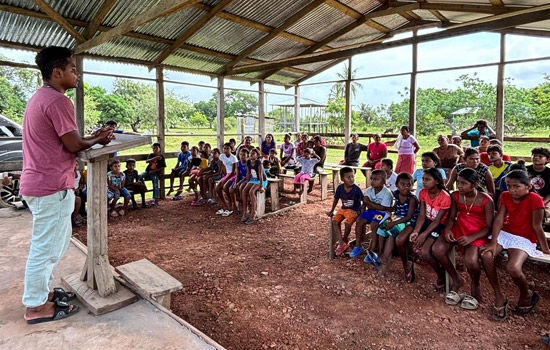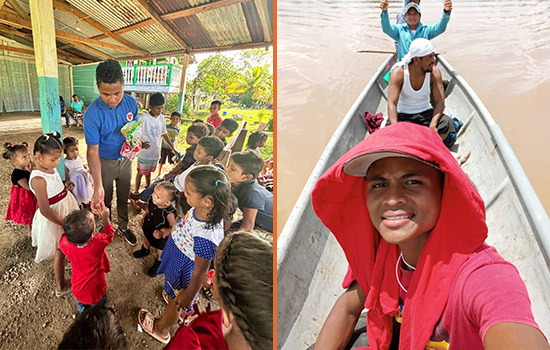Copyright © TMS Global
TMS Global
PO Box 936559
Atlanta, GA 31193-6559
800.478.8963
Our EIN number or Taxpayer Identification Number is 58-1546441.

Latin America is already home to some of the largest churches in the world. So why would a young Nicaraguan like Saúl Zúñiga give up the lure of medical school to become a missionary to his own nation?
Isn’t Latin America already exposed to the Gospel? Why do we keep sending Cross Cultural Workers and doing training there? Why not invest our resources in places where the name of Jesus goes mostly unspoken and unrecognized?
Those are critical questions that shape what it means for us to join Jesus in His mission. They’re also the reason TMS Global walks with leaders like Saúl—just because the gospel has reached a place doesn’t mean it’s changed the people there.
When we talk about a least-reached people group, we are referring to a distinguishable group of people that shares common identifiers—like language and culture—and lives within a defined boundary. And since they’ve had little exposure to the love and message of Jesus, they are also likely to follow another religion or no religion at all.
Consequently, we often picture them tucked away in remote places, or behind borders where the gospel is hard to reach. And many least-reached people do live in exactly those settings.
But could a least-reached people group actually live in sight of a dozen churches and even claim a Christian identity?
“Absolutely!” says Saúl Zúñiga.
A 28-year-old man from the Miskito people who live on the Atlantic coasts of Nicaragua and Honduras, Saúl grew up in a community called Sandy Bay Sirpi, which means “The Rose of Sharon.” The Biblical name is not an accident. Religious language and artifacts have been common among Miskito communities for almost 185 years.
Moravian workers arrived in Miskito territory in the 1840s and quickly built churches, schools, and hospitals—many of which still stand today. In fact, almost every Miskito community still contains a Moravian church. And if you ask a Miskito person about their religion, more than likely you’ll hear, “Yang nani sika Morevian,” or in English, “I’m a Moravian.” That’s been the answer for over a century.
To be Miskito often means to be Moravian.
But does claiming a Christian identity mean you have been regenerated by the Holy Spirit?
"The Moravians did a great job of sharing the gospel with us,” Saúl told us. “But, over time, people lost the focus of the faith. Churches that were once vibrant spiritual centers became cultural identifiers.”
Saúl knows this firsthand. Born to a Miskito family, he grew up in a place where religion was everywhere, but the message of Jesus hadn’t seemed to make a difference. His parents divorced when Saúl was young, and he lived with his mother until he was 14 when his father came to claim him. The next year, Saúl met Jesus after a local pastor shared the gospel with him. “From that moment on,” he says, “I began to serve Jesus with joy and gratitude.”
Three years later, Saúl graduated from high school with high honors. That’s when his real troubles started.
“My father had saved money for my education,” Saúl explained, “and I dreamed of becoming a doctor. I took the admission exam and achieved the highest score, which granted me a scholarship to study at an elite university.”
However, Saúl also received a scholarship to attend a mission training school. “I faced a great internal struggle: should I follow my dream of studying medicine or obey God’s call to missions? I felt I couldn’t talk to my father because he was not a believer and would not understand.”
After several days of prayer, Saúl had a dream. In it, he was standing on top of a mountain surrounded by many mountain ranges, each one with a flag of distinct colors. Then he heard a voice say: “This is called the 10/40 Window.” When he woke up, he researched and discovered that the 10/40 Window referred to the least-reached peoples of the world. He decided to become a missionary.
Saúl’s father cut him off, furious that he had chosen missions over medicine. But doors kept opening anyway. He finished his studies in missions, enrolled in pastoral theology, and soon was helping plant a new church— proof that obedience brought provision he never expected.
After the COVID pandemic, Saúl went home to his Miskito people, to the place where he was born and where he spoke the language of identity as well as commerce. Saúl quickly assessed the spiritual needs of the community—and found they ran deeper than he had expected.
“They needed a Christian spiritual life here,” Saúl told us. “Most pastors are not trained, which is one of many roadblocks to the gospel. Leaders need to understand the fundamentals: Who is God? What does the death and resurrection of Jesus mean? What does the Holy Spirit do in the world today?”
Seeing that the Miskito communities needed a church with a vision and a mission not focused on material things, Saúl began to work with pastors who wanted to dive deeper into scripture and missions. He planted two churches in his hometown. Both flourished. Ministry was good.
Then, a random meeting on the bus to his grandmother’s house in Coco River transformed his thinking about ministry.
“On the bus, I met a missionary from the U.S. who had been living in that area for 15 years,” Saúl said. “He spoke Miskito well, and I was thrilled to get to know him.” After Saúl arrived at his family’s home, he asked about the man he’d met.
“We don’t want more people like him here,” his aunt said.
Saúl was stunned. “Why not?”
Her reply cut deep. “He brings projects, but not Jesus. He uses our poverty as a story to raise money.”
And that’s one reason Latin America may look like it’s been reached with the gospel: missionaries and churches are everywhere, but the focus is often on money, not on Jesus.
Saúl knew he wanted to do something different. But what? The only models of mission he had seen resulted in either cultural Christianity or religious profiteering.
Then, Saúl received an invitation to attend TMS Global’s Maclin Training in Panama. “At Maclin, I learned that missions is about Christ, His gospel, and His people. In Latin America, we have often focused on spiritual returns for dollars spent, leaving us with converts we can count but not impact we have made. When missions takes time, people get frustrated and look for shortcuts.”
At Maclin, however, Saúl discovered how to evangelize, develop a vision, plant a church, and train leaders. Now, he's meeting every week at a cafe with four men, sharing truths about Christ and His Kingdom, and talking about how to walk alongside others on the journey to Jesus.
“Jesus trained 12 disciples, and they were multiplied,” Saúl says. “These four guys are my church right now. If God gives me the opportunity to build a traditional church, that’s great, but I'm starting with a small group—rooting people deeply in their faith in Christ.”
For Saúl, God’s mission is about more than converts he can count. It’s about making disciples who follow Jesus and invite others to do the same. And that’s the vision TMS Global is committed to equipping in Latin America and around the world.
